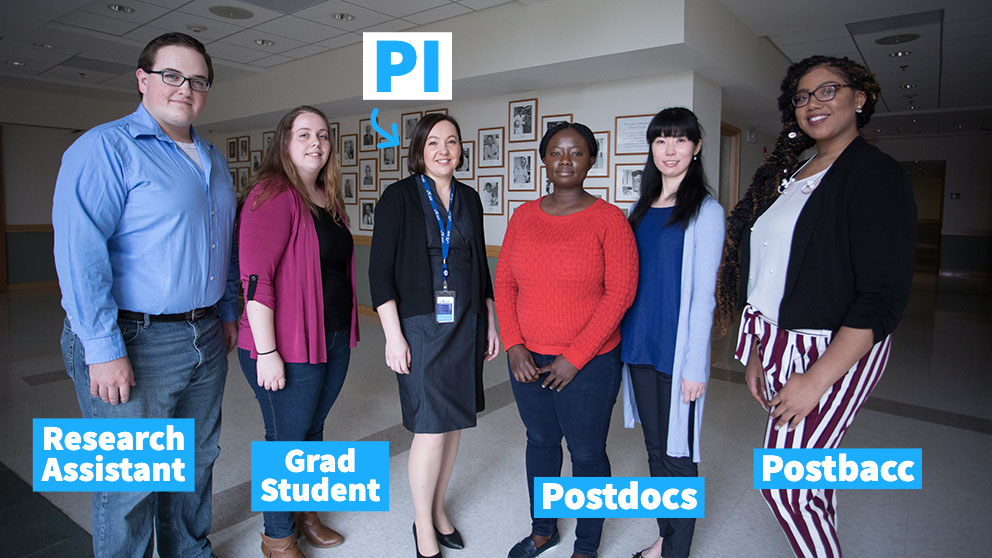The Bolcun-Filas lab convenes regularly to check up on the status of their female infertility research. I was curious about "who does what" in a lab, so I decided to join them for a day.
In the room were JAX Assistant Professor Ewelina Bolcun-Filas, Ph.D.Researching meiosis, the mechanisms of DNA damage detection and repair during normal development of gametes, and implications for fertility of cancer patients after radiation and chemotherapy.Ewelina Bolcun-Filas, Ph.D., her postdoctoral associates, a grad student, a postbaccalaureate intern, a research assistant and other collaborators. They passed around Dutch coffee cake to celebrate a recent Cell Biology Breaking up is hard to doNew research shows that proteins work together to enable DNA double-strand breaks during meiosis.paper and casually chatted about family cake recipes, imposter syndrome, and the discovery of semi-identical twins.
Postdoc Ruby Boateng gave a presentation about her research, entitled "Genetics of Female Fertility." While females are born with all the eggs they will have for their entire life, she explained, the size and quality of this initial "ovarian pool" vary throughout the population. Boateng looks for genetic variants that correlate with specific ovarian pool characteristics, aiming to gain a clearer understanding of fertility problems.
After the meeting, I joined the lab members for coffee—my chance to dig in and understand the dynamics of a lab; not to mention, what those tricky job titles mean. Here's what I learned:
Principal Investigator (PI): the head honcho of a lab
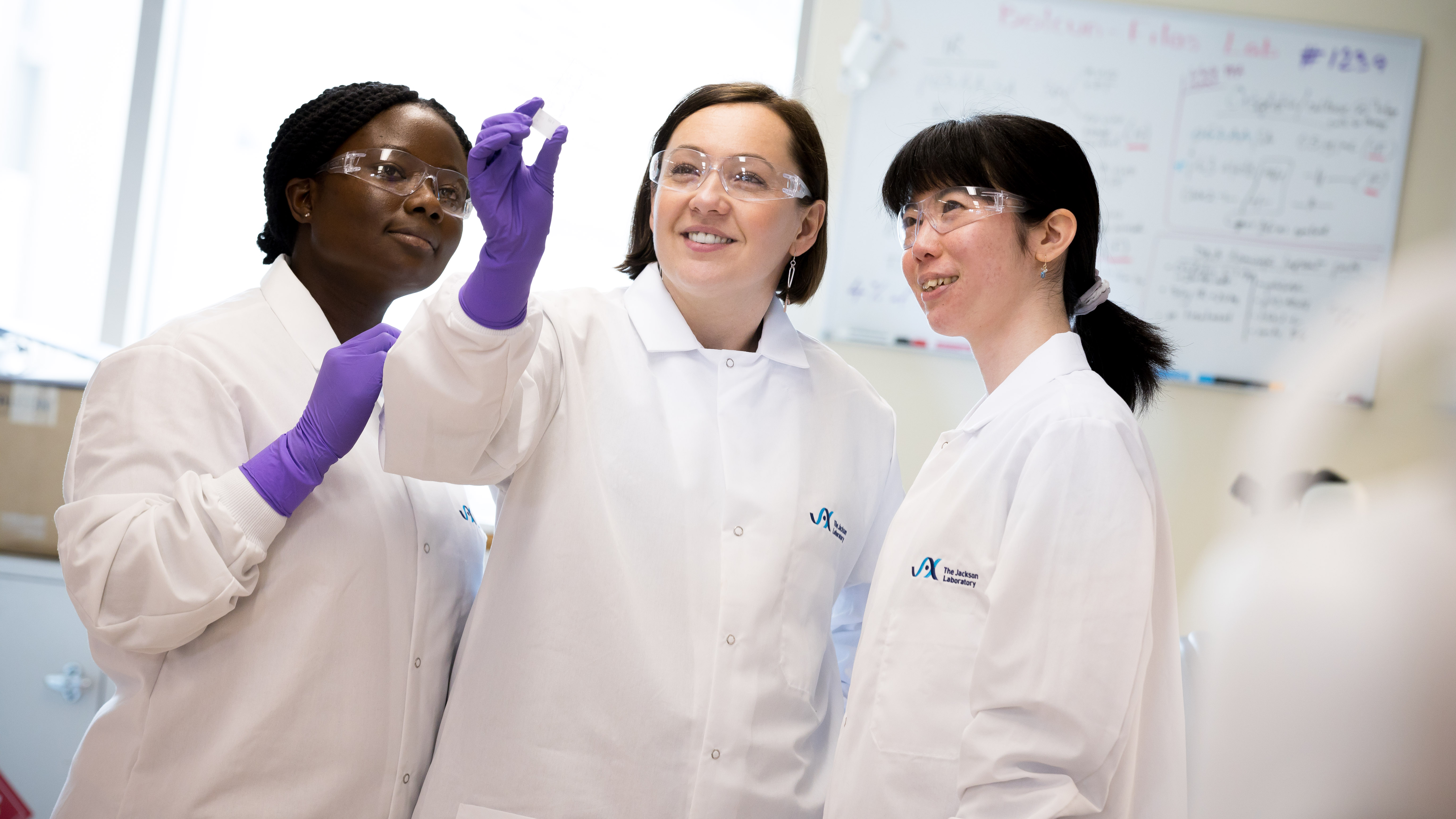 Ewelina Bolcun-Filas (middle) with postdocs Ruby Boateng (left) and Chihiro Emori.
Ewelina Bolcun-Filas (middle) with postdocs Ruby Boateng (left) and Chihiro Emori.
Getting to know Ewelina Bolcun-Filas, Ph.D.Profile of Ewelina Bolcun-Filas, whose research aims to understand the molecular mechanisms controlling the development of healthy gametes and how misregulation of these mechanisms can lead to reproductive disorders. Bolcun-Filas studies genetic causes of infertility at The Jackson Laboratory (JAX). As a PI, Bolcun-Filas runs her own lab, located in Maine. She secures the grants, she makes plans, and is, overall, the significant brains of the operation. Her most recent grant helped fund Boateng's work on genetics of ovarian pool variation. Bolcun-Filas' other work, in oncofertility, aims to help cancer patients and is funded by the V Foundation’s V Foundation funds JAX cancer research for third straight yearArmed with new funding from the V Foundation, Olga Anczuków-Camarda is uncovering genetic changes in the breast, paving the road to early cancer detection and prevention. V Scholar grant . She studies chemo- and radiation-induced DNA damage in oocytes (eggs), in order to help cancer patients retain the option of having children later in life.
Postdoctoral associate (postdoc): a trainee position for Ph.D. scientists; the postdoc's primary aim is to gain mentored research and professional experience before moving into an independent position.
Ruby Boateng and Chihiro Emori are the postdoctoral associates in the Bolcun-Filas lab. As postdocs, they spend a lot of time running their own projects in the lab, gaining teaching experience, and writing both grant applications and publication manuscripts. The postdocs say that they are still "in training" for life as scientists; this stint is their last opportunity to work under the umbrella of another PI, before going out on their own into the world of science.
One exciting aspect of being a postdoc, according to Boateng and Emori, is that it also allows them to focus on something they may not have gotten the chance to in grad school. For example, before joining JAX, Boateng studied both male and female fertility in C. elegans, a tiny worm. As a postdoc, she has had the time to become comfortable with an entirely new model organism — the research mouse.
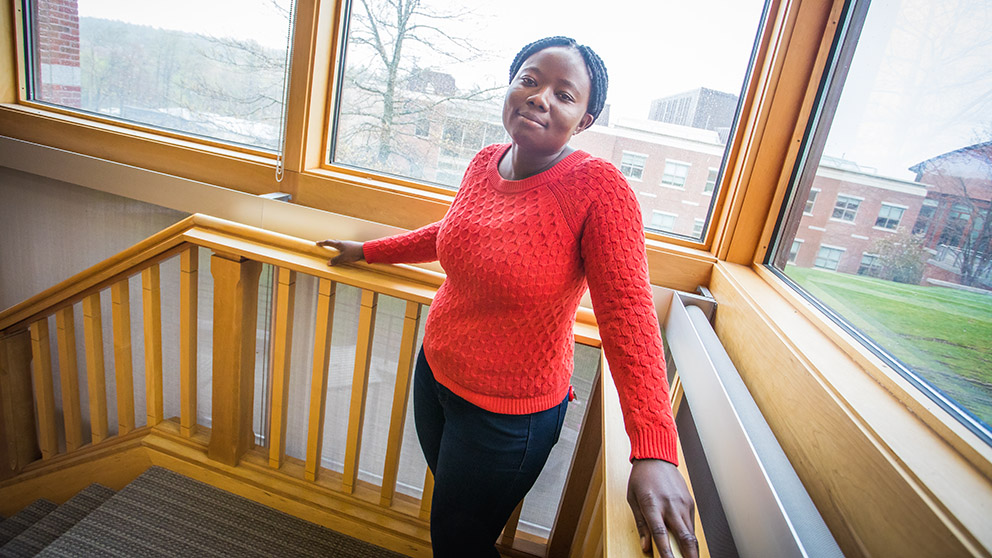 Postdoc Ruby Boateng
Postdoc Ruby Boateng
Emori also uses mouse models to study fertility; however, her research project is in the realm of protecting fertility throughout toxic cancer treatments. She tests the effects of various pharmacological cancer-killing agents in ovaries to understand how one might prevent oocyte loss caused by these treatments. She looks for druggable targets and tests promising candidates in chemotherapy-damaged oocytes, which could serve as a fertility-preserving therapeutic strategy for cancer patients.
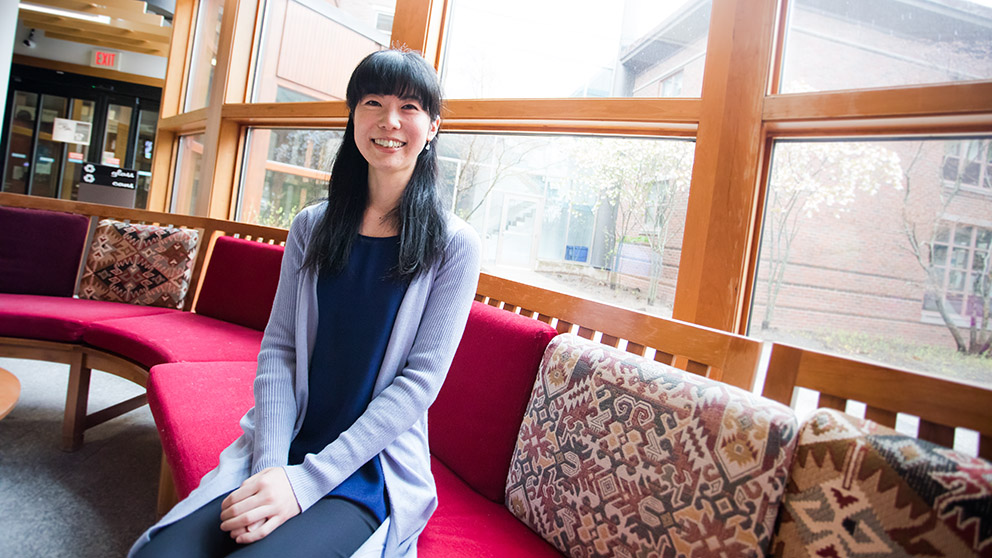 Postdoc Chihiro Emori
Postdoc Chihiro Emori
To hone their mentoring skills, Emori and Boateng teach the research assistants and other trainees. Teaching is new territory for them, and Emori and Boateng say they are grateful to have each other to bounce ideas off of. "Chihiro has immensely helped my transition from the worm world to the mouse world," says Boateng.
As for the mentees, instructions can range from lab techniques to presentation advice and social tips. "I like to make sure the grad students still have fun. So many people fail to keep having fun in grad school, and it's hard to merge back into social life after you graduate," says Boateng.
Predoctoral associate (grad student): A student pursuing an advanced degree, usually a Ph.D.; this student already has a bachelor's degree and is pursuing additional education in a specific field.
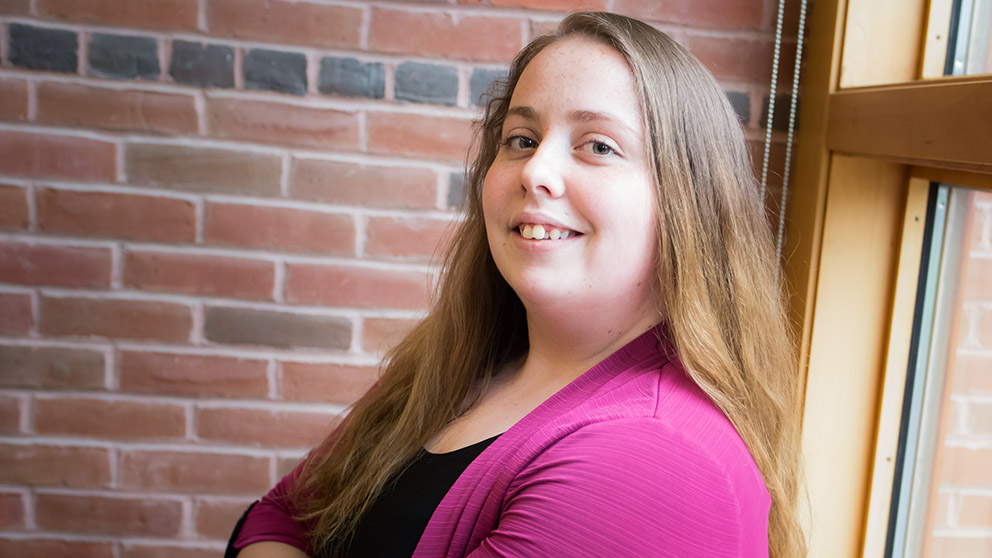 Grad student Monique Mills
Grad student Monique Mills
Monique Mills is a rotating grad student in the Bolcun-Filas lab. She is a member of the Graduate School of Biomedical Science and Engineering, a University of Maine graduate program that collaborates with JAX and other research institutions within the state of Maine. Mills will rotate through three labs before she picks the one where she will ultimately do her graduate work.
As a grad student, Mills is very busy with research projects and courses. She spends two full days a week, plus many afternoons, in the lab. On these days, she is immunostaining slides of ovaries to identify changes in oocyte numbers depending on irradiation therapy, developing and optimizing protocols to isolate pure oocyte populations, and creating single cell suspensions of ovaries.
Mills dedicates the rest of her time to her courses, which include animal physiology, bioinformatics, and biochemistry. In between running experiments and classes, she analyzes data, reads literature, and plans future experiments.
"My ultimate career goal is to become a principal investigator, where I hope to train other researchers," Mills says. "I would also like to work within aspects of science communication, to translate what we do in the lab to the public."
Postbaccalaureate Intern (postbacc): A trainee internship position for recent college graduates who want to gain research experience before they apply to doctoral programs.
Alisha Tillman is the postbacc in the Bolcun-Filas lab. This stop in Maine is her first exposure to working in a lab, and her long-term goal is to become an OB/GYN.
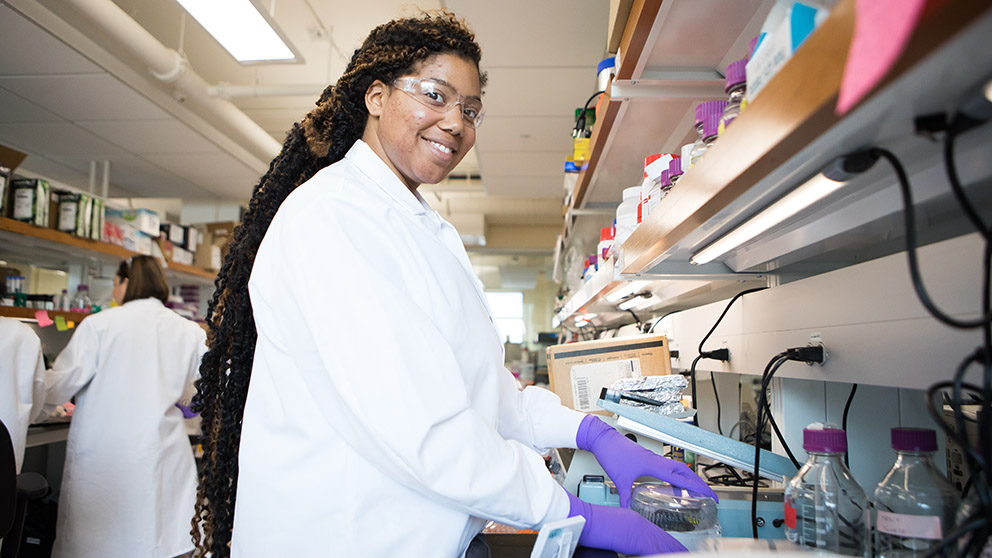
Postbacc Alisha Tillman
Here, she is studying the mechanisms of chemotherapy-induced oocyte loss. Tillman receives lists of experimental descriptions and aims from Bolcun-Filas, and then completes the research on her own.
As for professional development, Tillman meets regularly with fellow postbaccs and Carrie Cowan, Ph.D., Director of FAQ: Cooperative Ph.D. & Postdoctoral Associate ProgramsAnswers to common questions about the training environment at JAX for Ph.D. students and postdoctoral associates. We are a basic research, non-profit entity. We provide an exceptional training opportunity for students and postdocs interested in mammalian genetics and genomics.Postdoc & Predoc Education . The team works together to prepare for and apply to medical school. Outside of work, Tillman volunteers at the local hospital and studies for the MCATs.
Tillman decided to do the postbacc program at JAX to gain research experience before applying to medical school, but she picked Ewelina's lab because of her interest in female reproduction and cancer treatments. "Ewelina's research really hit home with me," says Tillman. "In high school, I had to deal with my mom undergoing a double mastectomy due to breast cancer. I've always had an interest in women's health."
"I want to empower women holistically by providing quality healthcare and safety in underserved communities," she says. The at JAX gives her the time she needs to approach these goals.
Research Assistant: A position for scientists with a bachelor's degree looking to apply and advance their scientific training.
Zachary Boucher is a research assistant in the Bolcun-Filas lab. He is a hands-on scientist, assisting with all of the team’s research projects. As seen below, Boucher spends all his time in lab, maintaining mouse colonies and reagents for the lab, cataloging genotypes, staining ovaries, and staying up to date with mammalian fertility research.
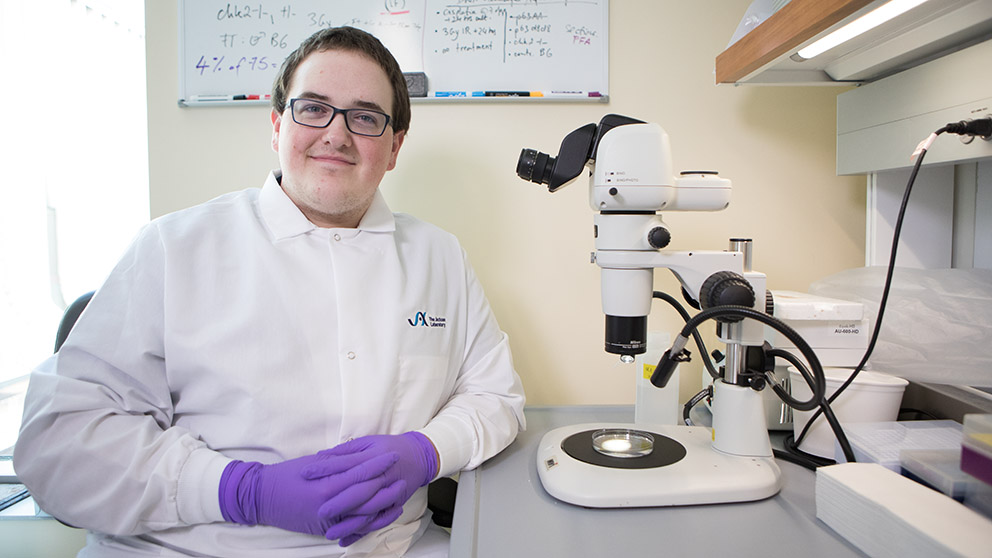 Research Assistant Zachary Boucher
Research Assistant Zachary Boucher
Boucher's presence helps the lab run smoothly. "He's great," says Mills. "He maintains everything for us so that we can do our work and not worry about everything else."
Boucher says he chose JAX because of its prestige and its alignment to his interests. “I was interested in genetics and genomics, and The Jackson Laboratory is a popular name," says Boucher. "I was drawn to Ewelina's lab because I have always strived to learn more about the biology of reproduction. I am interested in cancer treatments, having a strong genetic history of cancer in my bloodline."
"I chose to study this so that future generations of women will be able to live an improved life in remission from cancer," he says. "I hope that people will still be able to prosper, and have kids of their own, even if they have to undergo cancer treatments."
Lab or family?
"If you see us in our natural environment, we are just like a family," says Tillman. "We have lab talks about our favorite movies, and (Boucher) and I often have jam sessions to Lionel Richie."
Laughing about the pseudo-sibling rivalries that arise on busy days, she says, "Sometimes we all argue over microscope time. (Bolcun-Filas) has to butt in to calm everyone down."
"It's a nice lab. We like it," says Boateng.
